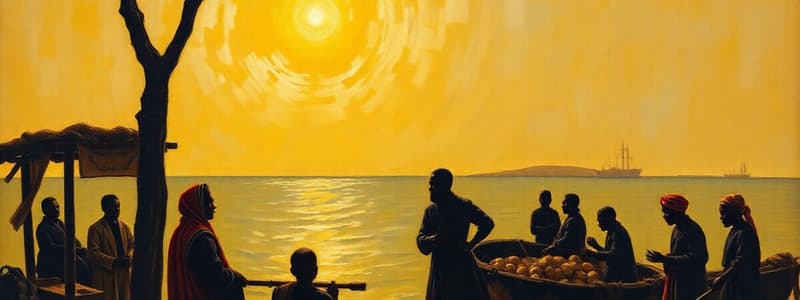Podcast
Questions and Answers
How did the spread of Islam and the Arabic language into Africa primarily occur, differing from other historical expansions?
How did the spread of Islam and the Arabic language into Africa primarily occur, differing from other historical expansions?
- Primarily through trade and gradual cultural exchange rather than military conquest. (correct)
- Through military campaigns led by Arabic rulers seeking to colonize West Africa.
- Via missionaries sent by Islamic caliphates to convert the African population.
- As a result of forced conversions imposed by West African kings adopting Islam.
Why was the region of West Africa and the Niger River compared to a 'sandy sea' during the 10th through 16th centuries?
Why was the region of West Africa and the Niger River compared to a 'sandy sea' during the 10th through 16th centuries?
- Because the river was prone to unpredictable and dangerous flooding.
- Due to the vast desert landscape resembling an ocean.
- As a metaphor for the political instability and constant power struggles.
- To highlight the booming trade and transport activities occurring across the region. (correct)
Initially, how did West African kings attempt to manage the growing influence of Islam within their kingdoms?
Initially, how did West African kings attempt to manage the growing influence of Islam within their kingdoms?
- Through the construction of large mosques to integrate Islamic worship.
- By trying to keep Islamic communities separate from traditional West African ones. (correct)
- Via integrating Islamic scholars into the royal courts to advise on governance.
- By encouraging the rapid conversion of the entire population to Islam.
What was the significance of Mansa Musa's pilgrimage to Arabia in the context of Islamic influence in West Africa?
What was the significance of Mansa Musa's pilgrimage to Arabia in the context of Islamic influence in West Africa?
What impact did the influx of Arab merchants have on the religious practices of West Africans over time?
What impact did the influx of Arab merchants have on the religious practices of West Africans over time?
What was the main impact of Mansa Musa's pilgrimage to Mecca on the kingdom of Mali?
What was the main impact of Mansa Musa's pilgrimage to Mecca on the kingdom of Mali?
Why did the prestige and wealth of African trading kingdoms eventually decline?
Why did the prestige and wealth of African trading kingdoms eventually decline?
How did the University of Timbuktu contribute to the cultural landscape of its time?
How did the University of Timbuktu contribute to the cultural landscape of its time?
Which factor significantly contributed to the spread of both Islam and the Arabic language in Africa?
Which factor significantly contributed to the spread of both Islam and the Arabic language in Africa?
According to historical accounts, what lasting impact did the architect commissioned by Mansa Musa have on Timbuktu?
According to historical accounts, what lasting impact did the architect commissioned by Mansa Musa have on Timbuktu?
Flashcards
Spread of Islam in Africa
Spread of Islam in Africa
The spread of Islam and the Arabic language in Africa occurred primarily through trade rather than war or conquest.
Golden Age of West African Trade
Golden Age of West African Trade
From the 10th to 16th centuries, trade across West Africa and the Niger River thrived, facilitating cultural exchange.
Role of Arab Merchants
Role of Arab Merchants
Merchants from Northern Arabia introduced the Arabic language and Islamic faith to West Africa through trade.
Initial Resistance to Islam
Initial Resistance to Islam
Signup and view all the flashcards
Mansa Musa
Mansa Musa
Signup and view all the flashcards
Islam in Africa
Islam in Africa
Signup and view all the flashcards
Mansa Musa's Architect
Mansa Musa's Architect
Signup and view all the flashcards
University of Timbuktu
University of Timbuktu
Signup and view all the flashcards
Shift in Trade Routes
Shift in Trade Routes
Signup and view all the flashcards
Islamic and Arabic Legacy
Islamic and Arabic Legacy
Signup and view all the flashcards
Study Notes
- Islam and the Arabic language spread through Africa via trade rather than war, gradually influencing the region.
Trade and Cultural Exchange
- Trade flourished in West Africa and the Niger River region from the 10th to 16th centuries, likened to a "sandy sea" due to its bustling trade routes.
- Camels were referred to as the "ships of the desert" due to their importance in trade.
Northern Arab Merchants
- Northern Arab merchants were among the first to venture into West Africa, trading goods like salt and silk for West African gold.
- The merchants brought their Arabic language and Islamic faith, which gradually integrated into African culture.
- Initially, West African kings attempted to restrict the spread of Islam by segregating Islamic communities.
- However, the large influx of Arab merchants made containment impossible.
- Over time, Islamic beliefs mixed with traditional African faiths, creating a blend of religious practices.
Mansa Musa's Impact
- Some West African rulers, such as Mansa Musa, fully converted to Islam.
- Mansa Musa, a wealthy king, made a pilgrimage to Arabia.
- Upon returning, he brought back numerous Arabic books and Islamic scholars, deepening the impact of Islam and the Arabic language on African culture.
- Mansa Musa commissioned an architect to build mosques and expand the University of Timbuktu.
- The University of Timbuktu was a significant center for Islamic learning, attracting students from Europe and Asia.
Decline and Legacy
- As Europeans discovered sea routes around Africa and interest shifted to the Americas, trade in Africa declined.
- The wealth of African trading kingdoms diminished.
- Even so, the Islamic faith and the Arabic language persisted in African culture.
Studying That Suits You
Use AI to generate personalized quizzes and flashcards to suit your learning preferences.




